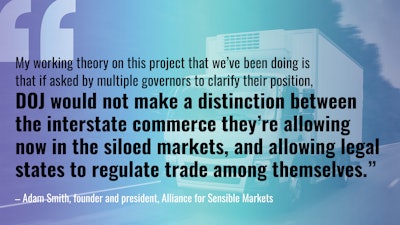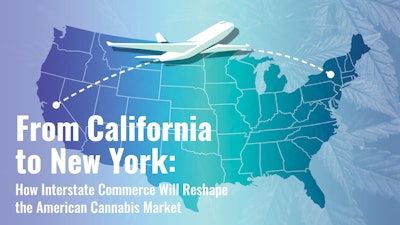
Buy the kind you want, from where you want. It’s a simple concept. The kind being discussed here is cannabis, in the context of interstate commerce.
Rezwan Khan, president of DNA Genetics and executive chair and president of nonprofit cannabis trade organization Global Alliance for Cannabis Commerce, says he would much rather see an open cannabis market in the U.S. than the current situation, where each company has to trade products within the sandbox of its own state.
“At the heart of everything, we live in a country where we’re supposed to be able to, as consumers, have access to products that are the best products in our country, whether it’s maple syrup from Vermont, or oranges from California or Florida, or avocados from California, or cheddar cheese from Wisconsin,” Khan says.
This idea is even backed by constitutional law. But in the federally illegal cannabis space, conventional wisdom is a tough sell.
“To not be able to provide a free and open market, where the normal laws of economics dictate who’s successful and not, whether your product is good, whether your marketing is good, whether you have a good business, a good service—you’re supposed to succeed based on that, not based on a stacked playing field ...,” he says.
Here, Cannabis Business Times caught up with industry experts about the potential benefits of interstate commerce and how it could come about. Two states, Oregon and California, have already passed interstate commerce laws, but they can’t yet take effect. And, as with other legal questions in the cannabis industry, not everyone in the industry agrees on how this will all shake out.
What Interstate Commerce Could Do for Cannabis
Adam Smith, founder and president of the nonprofit coalition Alliance for Sensible Markets, envisions that interstate commerce of cannabis would provide economic and environmental benefits. For one, he says, it would free up West Coast growers caught in a saturated market to sell their cannabis to customers in other states.
Smith says that West Coast states have established themselves as cannabis producer or exporter states, and that cultivation would by and large continue in those states. The bulk of industry operators in East Coast and Midwest states could focus on downstream segments of the supply chain, he suggests.
This potential industry landscape would make sense for multiple reasons, Smith says, including that start-up producers in the East wouldn’t have to build out costly and energy-intensive indoor and greenhouse facilities to grow the entire flower supply for a state, and processors, manufacturers, retailers, consumers and patients would all have more flexibility. Licensed businesses would have their choice of potentially thousands of sources for cannabis; the broader market would dictate flower quality and sufficient pricing.
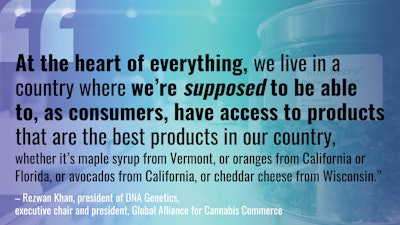
But it's not just about the sheer numbers; for a plant as complex as cannabis and a country as varied as the U.S., the question of interstate commerce is also about efficiency.
Khan says producers in states with hot, dry climates like Nevada, Colorado and Arizona can have difficulties with their cannabis becoming drying up quickly during the cure process. At the same time, he says various regions of the country already have agricultural infrastructure for other crops that could be conducive to cannabis production, but not all those states and municipalities allow cannabis businesses.
Khan says it doesn’t make sense from a business standpoint for markets to be set up the way they currently are, with distinct supply chains siloed in individual states and none in others. He adds that it’s a forced situation due to federal prohibition and the lack of interstate commerce. Cannabis is a plant that has specific climate needs, and not all states or supply chains can necessarily meet those needs in the same way.
But it's not so simple, of course.
Andrew Livingston, director of economics and research at law firm Vicente Sederberg, is based in Colorado, one of the legacy markets that could play a pronounced role in interstate sales in the future.
In addition to providing greater consumer choice and increasing opportunities for businesses, interstate commerce also has environmental benefits, Livingston says.
“You might think, to be transporting cannabis across the country—that seems like it would be a greater carbon footprint,” he says. “But there’s a reason that we don’t grow oranges in greenhouses in every state in the country. Plants in certain places grow best. And we need to grow them in the places where they grow best.
“That doesn’t mean that you can’t have great growers in any state in the country and that there won’t still be boutique cultivators. But it’s important to look at this from a perspective of what happens in all other industries. And there’s not really any other industry that’s circumscribed within the borders of each individual state.”
Burl Bryson is executive director of Washington state-based The Cannabis Alliance, a nonprofit industry association that focuses on cannabis policy reform there. The Washington cannabis market is well-known for craft cannabis, he says, which he sees as small, high-quality production.
“We’ve got great diversity of products,” Bryson says. “The thing that we don’t have is the California scale. Because of the ways our laws have developed, we don’t have acres and acres and acres under production. We’ve got the ability to grow in eastern Washington in large outdoor farms. But for the most part, what we’ve developed is really quality, craft, boutique cannabis brands here in Washington. So, I think that’s what really sets us apart.”
He wants the rest of the country to experience that.
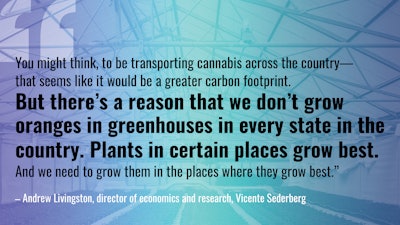
Word Needed From the Federal Government
Written words from the U.S. government could get interstate commerce rolling, Livingston says.
“It’s what needs to happen to make this happen, in my mind—is the federal government explicitly permitting it,” he says. “Does that require statutory change? Well, we’ve enabled now over three dozen state cannabis markets to occur without any change in federal law beyond a Department of Justice rider for nonenforcement on medical cannabis.”
That rider is a piece of Congressional legislation called the Rohrabacher-Blumenauer Amendment that ensures the federal government doesn’t spend funds to interfere in state medical cannabis programs. First signed into law as an attachment to an omnibus spending bill in 2014 as the Rohrabacher-Farr Amendment, it has been included in every federal budget since. (The names refer to former U.S. Reps. Dana Rohrabacher, R-Calif., and Sam Farr, D-Calif., and current Rep. Earl Blumenauer, D-Ore.)
To move the needle on interstate commerce, Livingston says a Department of Justice (DOJ) policy statement comparable to the Ogden Memo or Cole Memo could do the job.
In 2009, then-Deputy Attorney General David Ogden issued a memorandum outlining priorities for federal investigators and prosecutors in states with medical cannabis programs; those priorities included curbing illegal activity that medical cannabis programs prohibit, such as sales to minors and money laundering. In 2013, former Deputy Attorney General James Cole issued a similar, yet wider-sweeping memorandum, applied to adult-use markets, following successful legalization initiatives in Colorado and Washington state the prior November.
(Former Attorney General Jeff Sessions rescinded the Ogden and Cole memos in 2018.)
Despite their decisions to not reissue the Cole Memo, Sessions’ successor, William Barr, and current Attorney General Merrick Garland have said they have decided not to investigate and prosecute compliant state-licensed cannabis businesses.
So, is a more formal memo in the offing? Garland hasn’t been too clear on the cannabis question.
During Garland’s confirmation in 2021, he was asked by Sens. Chuck Grassley, R-Iowa, Ted Cruz, R-Texas, and Marsha Blackburn, R-Tenn., about the DOJ’s enforcement priorities for state-legal cannabis. Garland said in response to a question from Grassley, “I do not think it's the best use of the Department’s limited resources to pursue prosecutions of those who are complying with the laws in states that have legalized and are effectively regulating marijuana. I do think we need to be sure, for example, that there are no end runs around the state laws by criminal enterprises, and that access is prohibited to minors.”
Smith, of the Alliance for Sensible Markets, says that state-level public officials could press the matter and draw out some sort of position from Garland and his department.
“My working theory on this project that we’ve been doing is that if asked by multiple governors to clarify their position, DOJ would not make a distinction between the interstate commerce they’re allowing now in the siloed markets, and allowing legal states to regulate trade among themselves," Smith says, "Because there’s no legal distinction, and because there’s no political reason to fight with governors over this, their answer is very likely to be exactly what they have said all along, which is, ‘Where people are operating in good faith under state regulation, we don’t see a priority to get involved.’” (For more on legal distinctions, see the section, “Is Interstate Commerce Already Federally Protected?”)
Addressing the interstate commerce issue in the last Congressional session, U.S. Reps. Jared Huffman, D-Calif., introduced the Small and Homestead Independent Producers (SHIP) Act. The SHIP Act would allow intrastate and interstate commerce via the U.S. Postal Service or another interstate carrier, including direct-to-consumer sales. It would take effect if the U.S. government removed cannabis from the Controlled Substances Act (CSA) list of controlled substances. First, it would need to be reintroduced in the 118th Congress.
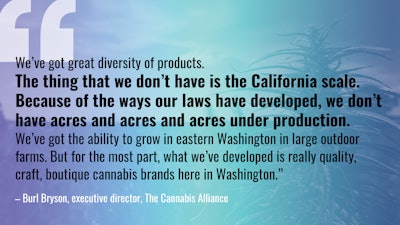
The Prospects of the U.S. Government Descheduling or Rescheduling Cannabis
President Joe Biden announced in October 2022 that he would direct Garland and Secretary of Health and Human Services Xavier Becerra to review cannabis’s position as a Schedule I drug under the CSA.
RELATED: Helpful, or Yet Another Hurdle?
If cannabis were descheduled, state governments would need to issue rules on interstate commerce, says Nicole Howell, partner at law firm Clark Howell.
“Generally speaking, [for] states that already have legal cannabis or some sort of program, if federal law was changed to completely remove cannabis from the Controlled Substances Act, then those state laws would make changes to conform their state rules to allow or not allow for interstate commerce, depending on what the policies were in those particular states,” Howell says. “So, it wouldn’t just be an automatic, next-day sort of thing.”
Addressing a possible rescheduling scenario, Howell says, “If cannabis is just rescheduled to another [schedule], like Schedule II, that would raise other complications. It wouldn’t turn the faucet on interstate commerce right away because … a Schedule II drug is still highly regulated. [You would] still have to have a DEA license to write a prescription for it.”
Khan says the Global Alliance for Cannabis Commerce is advocating for the federal government to deschedule cannabis and regulate it so interstate commerce can begin.
RELATED: Opinion: Rescheduling Is Recriminalizing, Descheduling Is Decriminalizing
“The way that we have it really mapped out [is] that TTB, the Tax and Trade Bureau, would regulate, and that the enforcement would go to ATF [Bureau of Alcohol, Tobacco, Firearms and Explosives],” Khan says. “And the reason being is because then you’re taking out of the conversation the DEA and the FDA.
“FDA oversight that would come with rescheduling … would also be crippling to the industry in other ways—[handing this industry] to the pharmaceutical industry. So, we don’t want FDA, really, to regulate this; we really want TTB to. And we don’t want DEA to enforce; we want ATF to, because it’s a different type of enforcement.”
RELATED: FDA Calls for Congress to Regulate CBD
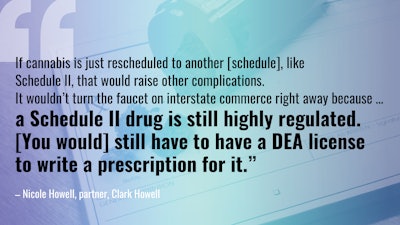
Motion in the States
State bills addressing interstate commerce in Oregon and California, which are considered “trigger laws” because they can’t take effect upon passage but must await some triggering event, have passed the legislatures and been signed by the states’ governors.
In 2019, the Oregon Legislative Assembly passed and former Gov. Kate Brown signed Senate Bill 582, the first state bill in the cannabis prohibition-era U.S. that allows for the interstate commerce of cannabis. This could be done if cannabis businesses’ products and practices are in accordance with certain Oregon regulations on testing, packaging, labeling and more. The bill would become effective only if federal law changes to allow interstate commerce or the DOJ issues an opinion or memo “allowing or tolerating” interstate commerce. Back to the federal drawing board.
Smith says he worked with Oregon Sen. Floyd Prozanski on S.B. 582 and received help with the bill language from Rob Bovett, who served as legal counsel to the Association of Oregon Counties.
Three years later, in California, S.B. 1326 became law. The same as S.B. 582, it would allow cannabis businesses to enter into agreements with cannabis businesses in other states with state-legal programs under certain parameters.
S.B. 1326 would become effective under either of the situations outlined by S.B. 582. In addition, it would go into effect if federal law changes to prohibit federal funds to go toward preventing interstate commerce, or if the state's attorney general issues a written opinion that enacting this trigger law would not result in any legal risk to the state. That's not necessarily an easy bar to clear.
Howell says S.B. 1326’s outlined attorney general pathway to implementation refers to the California attorney general, not the U.S. attorney general.
“What they’re referring to there in S.B. 1326 would be, theoretically, an opinion written by [California’s] attorney general that they’ve analyzed the state of affairs with regard to federal law and policy and are basically giving advice to our state government that, ‘We think the state could go ahead with this agreement with another state because we don’t think that it will subject the state to challenge or lawsuits from other states or from the federal government,’” Howell says.
California’s attorney general is Rob Bonta. Smith points out that when Bonta was a California assemblyman, Bonta was interested in sponsoring an interstate commerce bill that Smith had previously written with representatives of the Rural County Representatives of California (RCRC) and the Humboldt County Growers Alliance. However, because of the COVID-19 pandemic and pushback from California counties, the bill wasn’t introduced under Bonta's watch. He now has an opportunity to express his support for the idea once again.
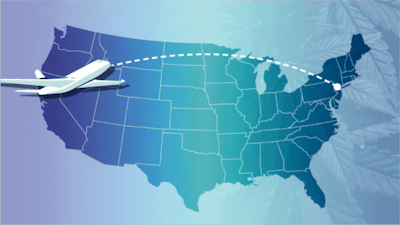
On Jan. 27, the California Department of Cannabis Control (DCC) issued an opinion to the state attorney general’s office stating that DCC does not believe that interstate commerce “will result in significant risk to the State of California under the federal Controlled Substances Act.” Signed by the DCC’s General Counsel, Matthew Lee, and approved by its Director, Nicole Elliott, the opinion cites numerous court cases, many of which directly involve cannabis, and state and federal laws.
DCC’s opinion includes overarching reasons:
- “The Controlled Substances Act could not constitutionally prohibit California from legalizing and regulating commercial cannabis activity with out-of-state licensees”
- “The Controlled Substances Act does not, in fact, criminalize California’s legalization and regulation of commercial cannabis activity with out-of-state licensees”
- “Federal law further insulates California from significant risk as to agreements concerning medicinal cannabis.”
(To support the third point, Lee cites the Rohrabacher-Blumenauer Amendment. For more on the opinion’s legal arguments, see the section, “Is Interstate Commerce Already Federally Protected?”)
In Washington state, S.B. 5069 is moving through committees. On behalf of The Cannabis Alliance, Bryson testified to the state Senate with the request to include language allowing interstate commerce to move forward if an opinion or memo is issued by DOJ. As of this article’s publishing, that language is included in the bill. Bryson is also advocating for the bill to take effect if the state’s attorney general issues a written opinion stating that interstate commerce will not put the state at significant legal risk.
Another organization that has been instrumental in the interstate commerce initiative in Washington state is the Washington Sun & Craft Growers Association, Bryson says.
In addition, New Jersey Senate President Nicholas Scutari introduced an interstate commerce bill, Senate No. 3012, in September. The bill is currently in the Senate Judiciary Committee. If it passes in its current iteration, it would also be a trigger bill and would only take effect under certain conditions, in the same way as the three West Coast bills.
“California farmers have said the same thing. Those state bills reflect the interest of the industry in those states, to open up and to gain a national market—to be able to save their state industry. But,” he says, stating a different view than interstate-commerce state bill advocates, “it’s not going to fly until there's movement at the federal level.”
How much longer will it be before interstate commerce begins?
“It’s kind of the Ned Stark effect,” Bryson says, referring to the popular “Winter is coming” quote from a “Game of Thrones” character. “Interstate commerce is coming. We don’t know when it’s going to come. We don’t know what exactly it’s going to look like when it gets here. But we’re doing everything that we can to prepare for it."
